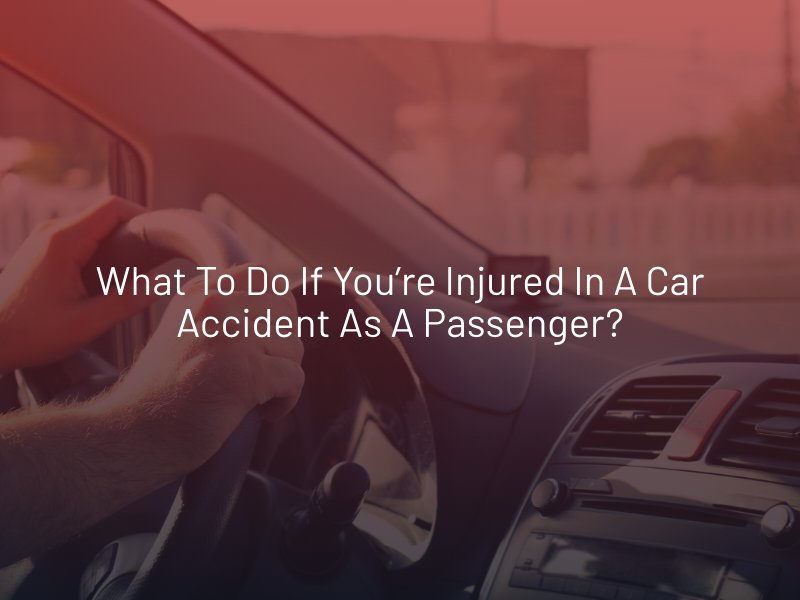What To Do If You’re Injured in a Car Accident as a Passenger?
If you are injured in a car accident as a passenger, you have the ability to file a claim under the at-fault driver’s auto insurance policy. In some cases, you may be able to file a claim against both drivers’ insurers, or pursue a personal injury lawsuit if you are denied coverage.

What to Do Immediately After an Accident
There are some critical steps to take after a car accident as an injured passenger:
- Call 911 if you or anyone else needs immediate medical assistance.
- If you do not require emergency medical care, still notify the police if a driver hasn’t already. A police report can be important when it comes time to file an insurance claim.
- Take photos & videos for evidence.
- Ask all parties involved for their contact and insurance information. If there are witnesses, ask for their contact information as well.
- Seek medical care as soon as possible and continue any ongoing treatment your doctor recommends.
- Speak to a Las Vegas car accident attorney for legal counsel regarding your options for obtaining compensation for your injuries.
Since Nevada is a fault-based auto insurance state, a settlement can be negotiated once you are healed or improved as much as you are capable of. Suppose you were injured in an accident as a passenger in a ride-sharing vehicle. In that case, the claims process will differ slightly, as the rideshare driver’s employer might be responsible for damages.
Insurance Claim Options for Injured Passengers
There are typically several options for recovering compensation as an injured passenger in a crash.
The Other Driver’s Insurer
A claim can be filed with the auto insurer for the driver of another vehicle that was at fault for your accident. In Nevada, drivers are required to carry minimum amounts of liability insurance to pay for the injuries and damage they cause. As a result, if the driver has insurance, they will have at least $25,000 in bodily injury coverage per person, $50,000 in bodily injury per accident, and $20,000 in property damage. However, you may have to share those coverage amounts for bodily injury with the driver of your vehicle. If the driver’s insurance limits do not fully cover accident expenses, such as medical bills and lost income, you can possibly file a claim under the policy belonging to the driver of your vehicle as well.
Your Driver’s Insurer
Regardless of whether they were at fault, you may be able to file a claim under the driver of your vehicle’s policy. Their liability coverage should apply to you as a passenger. Although you may feel uncomfortable filing a claim if the driver of your vehicle is a friend or family member, keep in mind that you will deal with the insurer directly. Your friend or family member does not have to be involved with the process.
Your Auto Insurance or Health Insurance
An alternative option is to file a claim under your own auto insurance policy if you carry MedPay or personal injury protection (PIP). If either driver was not insured, you might be able to file a claim under your own uninsured motorist insurance. However, if you only have the minimum liability coverage required by law, your policy only covers harm done to others. Lastly, your personal health insurance can typically be utilized, but all auto benefits may need to be exhausted first, depending on your plan.